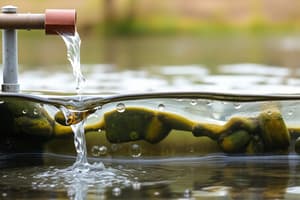Podcast
Questions and Answers
What is the property of water that prevents lather formation of soap?
What is the property of water that prevents lather formation of soap?
- Salinity
- Alkalinity
- Hardness (correct)
- Acidity
Which ions contribute to the hardness of water?
Which ions contribute to the hardness of water?
- Chloride (Cl-) ions
- Sodium (Na+) ions
- Potassium (K+) ions
- Calcium (Ca2+) ions (correct)
What type of hardness can be removed by simple boiling?
What type of hardness can be removed by simple boiling?
- Permanent or non-Carbonate Hardness
- Saline Hardness
- Temporary or Carbonate Hardness (correct)
- Alkaline Hardness
What is the soap consuming capacity of water known as?
What is the soap consuming capacity of water known as?
What do Calcium and Magnesium ions react with to form insoluble scum in water?
What do Calcium and Magnesium ions react with to form insoluble scum in water?
What is the property of water that prevents lather formation of soap?
What is the property of water that prevents lather formation of soap?
Which ions contribute to the permanent hardness of water?
Which ions contribute to the permanent hardness of water?
What type of hardness can be removed by simple boiling?
What type of hardness can be removed by simple boiling?
What is the range of hardness in mg/L (ppm) for very hard water?
What is the range of hardness in mg/L (ppm) for very hard water?
What do Calcium and Magnesium ions react with to form insoluble scum in water?
What do Calcium and Magnesium ions react with to form insoluble scum in water?
Flashcards
Water Hardness
Water Hardness
The property of water that prevents soap from forming a lather.
Ions responsible for water hardness
Ions responsible for water hardness
Calcium (Ca2+) and Magnesium (Mg2+) ions are the main culprits behind water hardness.
Temporary Hardness
Temporary Hardness
Temporary hardness is caused by the presence of calcium and magnesium bicarbonates. It can be easily removed by boiling the water as these bicarbonates decompose into insoluble carbonates that are removed as sediment.
Water Hardness
Water Hardness
Signup and view all the flashcards
Scum formation
Scum formation
Signup and view all the flashcards
Water Hardness
Water Hardness
Signup and view all the flashcards
Permanent Hardness
Permanent Hardness
Signup and view all the flashcards
Temporary Hardness
Temporary Hardness
Signup and view all the flashcards
Very Hard Water
Very Hard Water
Signup and view all the flashcards
Scum Formation
Scum Formation
Signup and view all the flashcards
Study Notes
Properties of Water and Soap Interaction
- High surface tension of water inhibits soap lather formation, making it less effective in hard water conditions.
Ions Contributing to Water Hardness
- Calcium (Ca²⁺) and Magnesium (Mg²⁺) ions are primary contributors to water hardness.
Types of Hardness in Water
- Temporary hardness can be removed by simple boiling; it involves bicarbonate ions that precipitate as carbonates when heated.
Soap Consumption Capacity
- The soap-consuming capacity of water is referred to as "hardness."
Formation of Insoluble Scum
- Calcium and Magnesium ions react with fatty acids from soap, forming insoluble scum, which reduces soaps' effectiveness.
Ions Indicating Permanent Hardness
- Permanent hardness is mainly caused by sulfate (SO₄²⁻) and chloride (Cl⁻) ions, which cannot be removed by boiling.
Hardness Classification
- Very hard water contains hardness levels greater than 300 mg/L (ppm).
Studying That Suits You
Use AI to generate personalized quizzes and flashcards to suit your learning preferences.




